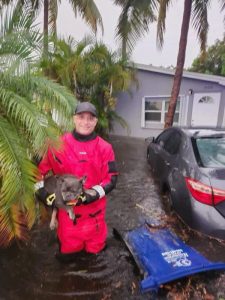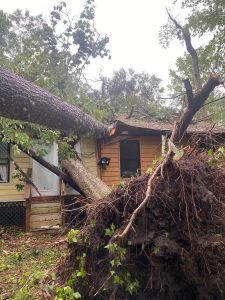Federal disaster aid for Tallahassee tornados
 The recent South Florida deluge generates several thousand automobile insurance claims for flooded vehicles and a data call, Tallahassee gets a federal disaster declaration for last month’s tornados, there’s new money for home mitigation and insurance regulation, plus a hefty increase in medical reimbursement in Florida workers’ compensation insurance. It’s all in this week’s Property Insurance News.
The recent South Florida deluge generates several thousand automobile insurance claims for flooded vehicles and a data call, Tallahassee gets a federal disaster declaration for last month’s tornados, there’s new money for home mitigation and insurance regulation, plus a hefty increase in medical reimbursement in Florida workers’ compensation insurance. It’s all in this week’s Property Insurance News.

One of 36 high water rescues performed by the Broward Sheriff’s Office Fire Rescue Dept., June 13, 2024. Courtesy, Broward S.O.
South Florida Flooding: The big rain event in Broward and Miami-Dade counties of June 11-13 that riveled any tropical storm went by the meteorological name of Invest90L. It dumped upwards of 20” of rain in spots and stranded countless vehicles in roadways and breached some homes and businesses. Insured damage could reach several hundred million dollars. State Farm Insurance alone reported last week it received 1,200 auto claims for flood damage. The Governor declared a state of emergency in those counties as well as Collier, Lee and Sarasota counties, where tens of thousands of gallons of sewage spilled. The Florida Office of Insurance Regulation has issued a data call for property insurance companies to report claims for each of the next four Wednesdays, beginning this Wednesday (June 26) by noon ET.

Tornado damage in Tallahassee’s Blairstone Forest neighborhood, May 10, 2024. Courtesy, Shawn Foster
Tallahassee Declared Federal Disaster Area: President Biden has approved federal disaster assistance for Tallahassee and Leon County in the wake of the May 10 tornadoes that killed two people, destroyed 55 homes and damaged at least 640 others. The three EF-2 tornadoes created a path of damage across North Florida. Federal funding is now available to individuals in Leon County, including grants for temporary housing and home repairs, low-cost loans to cover uninsured property losses and other programs to help individuals and business owners recover. Federal money is also available to state and local governments and certain private nonprofit organizations on a cost-sharing basis for emergency work and the repair or replacement of facilities in Baker, Gadsden, Hamilton, Lafayette, Leon, Liberty, Madison, Suwannee, Taylor and Wakulla counties.
 More Money for Mitigation & OIR: Governor DeSantis recently signed into law a $116.5 billion state budget for the new fiscal year that begins July 1. The money includes $200 million for the My Safe Florida Home Program and another $30 million for the My Safe Florida Condominium Pilot Program. The budget also includes money for the Office of Insurance Regulation (OIR) to expand its research and data collection capabilities, specifically:
More Money for Mitigation & OIR: Governor DeSantis recently signed into law a $116.5 billion state budget for the new fiscal year that begins July 1. The money includes $200 million for the My Safe Florida Home Program and another $30 million for the My Safe Florida Condominium Pilot Program. The budget also includes money for the Office of Insurance Regulation (OIR) to expand its research and data collection capabilities, specifically:
- $1.1 million to bolster OIR’s ability to curate data related to Florida’s property insurance market.
- $675,000 to contract for independent reinsurance and mitigation research experts to expand OIR’s ability to review filings and recommend new tools to mitigate properties from hurricanes.
- $500,000 to study the impact of substantial improvement periods on community rating system discounts and insurance rates as calculated by FEMA and Florida’s local floodplain managers.
- $475,000 to contract with a reinsurance expert to analyze reinsurance cycles and how they are impacting property insurance rates.
- $200,000 to research and identify additional mitigation measures that provide discounts to consumers on their homeowners’ insurance premium.
- An additional $6 million increase for the Florida International University to upgrade and enhance the capabilities of the Florida Public Hurricane Loss Model to improve the geographic assessments and to include perils not currently contemplated in the model.

Workers’ Comp Reimbursement: The Governor also signed into law SB 362 which increases reimbursements for medical care provided under the state’s workers’ compensation insurance laws. The maximum reimbursement allowances for physicians will increase from 110% to 175% of the reimbursement amount allowed by Medicare, and the maximum for surgical procedures will increase from 140% to 210% of the reimbursement amount allowed by Medicare. It also increases the maximum hourly amount allowed for expert witnesses to $300 per hour and to $300 per day for those subject to the daily rate. The changes are effective January 1, 2025.
LMA Newsletter of 6-24-24

